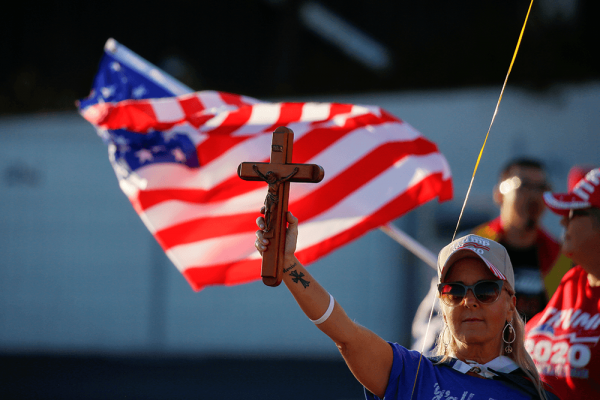For faith activists and leaders committed to continuing their work to oppose and resist Christian nationalism, President-elect Donald Trump’s return to the White House is disappointing but not a sign of total defeat. Ahead of Inauguration Day, many activists are continuing their coalition-building efforts and sounding the alarm on specific policies they believe Trump may sign executive orders on, day one in office.
Amanda Tyler, the executive director of the Baptist Joint Committee for Religious Liberty, an organization that advocates for religious liberty, said she felt deep sadness and concern for those who will be most impacted by a second Trump administration. But she also felt a hopeful resistance.
“This is not the time to be defeated, but rather the time for people who are concerned for the well-being of all of our neighbors to join together to be sure that we are about creating the flourishing society that we all need,” Tyler said.
BJC’s work was never centered around the electoral cycle, Tyler said. She published her book, How to End Christian Nationalism, in 2024 knowing that the work would be difficult regardless of who was elected. However, BJC did spend this election season educating congregations on how they can help protect free and fair elections.
Before the results were known, Tyler and the organization were already crafting new strategies for tackling Christian nationalism, such as training people on how to speak to their school boards and testify before state legislatures about unjust education policies.
In places like Oklahoma, government officials have approved placing Bibles in public schools, which has been costly and sparked pushback from civil rights groups like the American Civil Liberties Union. Parents, teachers, and ministers in the state have banded together, filing a lawsuit last month to stop Bible lesson plans from being incorporated into public school curriculum.
As the results became clearer, Tyler said she began focusing on the looming threat of mass deportations. Trump has promised he will increase deportations by invoking the Alien Enemies Act of 1798. Legal experts have said the president doesn’t have the authority to do so, since the law is for deporting noncitizens from a country considered an enemy of the U.S. during wartime. According to NBC, his team is planning to begin with undocumented Chinese immigrants.
“I do think that the work of on-the-ground organizing is even more urgent in preparation of a possible mass deportation strategy. I think that people of faith need to be working with their neighbors, regardless of religious affiliation, to protect the most vulnerable in our communities,” she told Sojourners. “Everywhere I go, I’m talking to people about the mass deportation policy and urging them to be working within their religious communities to discern what their place might be in providing safe harbor and resistance if members of their communities are targeted.”
Despite limitations to imposing the Alien Enemies Act, Robert P. Jones and other experts are concerned about whether Trump will sign an onslaught of far-reaching executive orders on his first day in office.
Jones is the founder and president of the Public Religion and Research Institute, which has conducted research on the intersection of religion, culture, and politics for over 15 years. Jones said PRRI has made a deeper commitment in the last five years to raising awareness about Christian nationalism and will continue to do so under this new administration.
“I think part of what a research organization does is it tries to get the best [information] and have our finger on the pulse of the population,” Jones said. “In terms of threats to democracy, that means sounding the alarm when we see things that are weakening democracy. It also means highlighting places where there’s resistance to those erosions.”
PRRI’s poll results by religious affiliation in the last three presidential elections have shown white evangelical Protestants’ steadfast commitment to Trump. Jones said that despite Trump’s campaign being the most overtly racist that he has seen in his lifetime, it wasn’t a deterrent for white Christians. “As far as we can tell from the exit polls right now, this extremist, racist, xenophobic language from a leading candidate did not move white Christian voters one millimeter.”
PRRI’s preliminary exit poll data, which can sometimes help researchers understand how population groups voted, found that 81% of white evangelical Protestants voted for Trump in 2024. By contrast, their preliminary exit polls found 86% of Black Protestants voted for Democratic candidate Vice President Kamala Harris. “I think we’re so accustomed to the great gulf between white and Black Christians in this country that we’re a little numb to what that means,” Jones said. “This ought to be a scandal.”
When asked what the steadfast support for Trump among white evangelicals means for all the work anti-Christian nationalism leaders have done for nearly a decade, Jones said that despite their continuous allegiance to Trump, white evangelical membership is shrinking. He also believes the work anti-Christian nationalists have done has influenced prominent figures like Beth Moore, David French, and Russell Moore’s decisions to leave their denominations. (French left the Presbyterian Church in America in 2024. Both Moores, who are not related, left the Southern Baptist Convention in recent years).
“I think we’ve got to face the hard facts that white supremacy has lived quite comfortably within Christianity for most of our country’s history. So I think on the face of it, people want to say, ‘Oh, well, white supremacy is antithetical to Christianity.’ But the hard truth of it is that most white Christian denominations have been quite comfortable with white supremacy up until our very recent history.”
Reverend Nathan Empsall, executive director of the digital grassroots organization Faithful America, said their focus in the coming months will be less on trying to change the minds of white evangelicals and instead ensuring that other Christians are speaking up for social justice and progressive values in Jesus’ name.
“In Jesus’ name, we will support and be for immigrants and refugees,” Empsall said. “We will support and be for LGBTQ rights, particularly employment protection and transgender rights, in Jesus’ name. We will support access to safe, legal abortion care. We will support racial equality, and we will support economic justice and prosperity for all, particularly the working class and those in poverty, as Jesus did.”
How will Empsall and others do this? “This is where there’s a lot to be figured out in the coming months, but we know that we will be grassroots, Christian-driven,” he said. Faithful America is planning to survey its 200,000 members to see what support they need to continue or begin this work.
Empsall said those resisting Christian nationalism must define what they are for, not just that they are against Christian nationalism. For Empsall, that includes racial equality, reproductive health care, and caring for the poor. Faithful America, which has always functioned as a national organization, is planning to do more on-the-ground work in local communities.
“Elections change who’s in charge, but they don’t change the country. The country changes the elections,” he said. “You’ve got to focus on the country, on its people, on the church, on spirituality, on culture.”
Empsall encouraged those who may be growing weary to not give into despair, saying, “We need to learn from past resistance movements and Christian resistance movements against fascism.”
Got something to say about what you're reading? We value your feedback!






